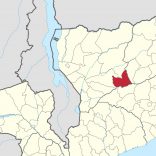Mozambique: Mpox cases in Niassa rise
The 2018 start of the school year and the ‘business’ of school material in Maputo

Notícias
The 2018 academic year officially starts tomorrow across the country – hence the hustle and bustle of parents and caregivers trying to purchase school uniforms and stationery, and the schools busy looking at timetables and the availability of text books.
As a result, shops selling school supplies, books and uniforms are out of step with rising demand.
The situation is such that, from one moment to the next, school supplies informal vendors are doing brisk business card on the capital’s main streets, mainly in Maputo’s ‘Baixa’, the avenues Zedequias Manganhela, Guerra Popular, Filipe Samuel Magaia, Josina Machel and Fernão de Magalhães.
Even those who sell used clothing, hardware, shoes, suitcases, and various appliances have momentarily turned their attention to the sale of school supplies, which are mostly obtained from establishments that sell similar goods and become potential competitors.
Notícias visited a number of outlets, and dealers say they have abandoned their previous business because turnover of school supplies is better these days.
“I started selling mobile phone accessories in 2015, but the business has not been looking so great. At this time it’s is more school supplies which are bought, so that’s what I moved in to,” informal merchant Lázaro Celestino said.
The same reason led Isaac Fernando to leave the footwear business, which he has been in for three years.
“These days, we have significant numbers of customers looking for notebooks, drawing materials and other items for school use. Even when demand falls, I continue to sell a little to support my family,” he says.
Demand generates opportunity
One of the biggest hazards for customers going to Baixa for school supplies is opportunism, with dishonest people pushing up prices.
Jorge Tembe, a 21-year-old boy in charge of purchasing school supplies for himself and his siblings, bemoans the fact that every year school material prices go up.
“The explanation is always the same: the cost of supplies has increased. But I do not understand how this happens because the metical has gradually appreciated against the rand and other currencies,” he says.
However, despite the numbers of buyers, our interviewees talk about a reduction in the level of demand compared to previous years, in addition to alleged price speculation.
Vendors say that this is related to the increased costs of acquiring the material, but they say that everything is done not to harm customers.
One box of hardcover notebooks, for example, costs 2,550 meticais against 2,300 last year. So a package of five notebooks, previously sold at 230 meticais, can cost from 260 to 280 meticais.
The school uniform business has also taken Baixa by storm. Here, the light blue shirts and the dark blue pants characteristics of primary education feature.
Filomena Bernardo was among the entrepreneurs who did not want to miss out on the opportunity to make some money in the uniform business, and dropped her line of baby clothes. According to her, the uniforms are acquired in neighbouring South Africa, and from tailors with an eye on the school year.
Free books for sale in the parallel market
Despite appeals by the Ministry of Education and Human Development against the sale of books supposedly available free, these continue to be sold at many points of the city of Maputo, mainly in the informal market.
Primary education books (1st to 7th grade) are available in the informal market at prices ranging from 150 to 200 meticais each. One of the main loci is Maputo’s Baixa, where there is an abundance of informal sellers and buyers.
Due to constant government warnings discouraging selling free school supplies and talk of fines, book sellers act with caution.
The manuals are not sold on sight, and transactions depend on informal vendors feeling confident that they are not facing prosecution. The books are covertly taken out of bags containing other articles.
At Notícias’ request, a passerby asked about the availability of Grade 6 books, to which the saleswoman replied that all curriculum subjects were available.
The major bookstores are crowded, a salesperson pointing out that there is a tendency for customers to leave everything to the last minute.
But parents and guardians say that lack of financial resources means that only now can they afford the essentials. Due to the lack of money, most parents are splitting purchases, postponing the acquisition of other materials until later.
Apart from the option of street uniforms, the specialist shops are also flooded at this time of the year.
The Ministry of Education and Human development (MINEDH) released a list of the 65 books to be used in all secondary schools last year and this. They are published by Longman Moçambique, Oxford, Emperadora, Texto Editores and Plural Editores.
MINEDH spokesman Manuel Simbine says the book list will be valid for five years, after which an evaluation will be made about renewing contracts.
The Grade 8 books for Biology, Visual Education, Physics, Geography, History, Mathematics, Portuguese and Chemistry are from Texto Editors. The one for Physical Education is from Plural Editores, and English Language one from Longman Mozambique.
The Grade 9 books are mostly Texto Editors, which will guarantee the disciplines of Physics, Geography, History, Mathematics, Portuguese, Chemistry and Notions of Entrepreneurship. For its part, Plural Editores provides the books of Biology, Physical Education, Visual Education and French. Oxford got the English manual.
The list published by the MINEDH indicates that, of the 13 Grade 10 books, eight are from the Texto Editores, namely Agro-Livestock, Physics, Geography, History, Mathematics, Notions of Entrepreneurship, Chemistry and Information and Communication Technologies. The remaining five – Biology, Physical Education, Visual, French and Portuguese – are produced by Plural Editores.
The 15 Grade 11 books are from three companies, and Texto Editores will lead again with eight (Agro-Livestock, Biology, Descriptive Design and Geometry, Visual Education, Geography, History, Introduction to Philosophy and Mathematics ); the Plural Editores with six and the Emperadora with two manuals, for Introduction to Psychology and Pedagogy.
In Grade 12, 13 of the books are from Texto Editores and Plural Editores, and the Mathematics will be provided by both publishers, as happens in Grade 11. The Texto Editores books are for Agro-Livestock, Biology, Design and Descriptive Geometry, Physics, English, Philosophy, Entrepreneurship and Chemistry, while Plural Editores supplies Geography, History, Portuguese and ICT.
A survey by Notícias found that most schools did not yet have textbooks. Meanwhile, let us hope that by the start of term everything is in place, especially as some teachers are yet to report to work.












Leave a Reply
Be the First to Comment!
You must be logged in to post a comment.
You must be logged in to post a comment.